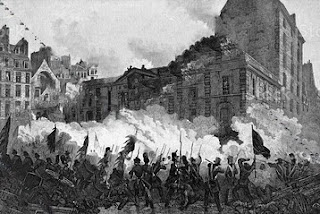Character analysis of Willy Lowman along with his tragic consequence in life
 |
| Death of a Salesman |
The tragic hero, according to the Greek philosopher Aristotle, must be "great", "appropriate" and "consistent" in the enjoyment of a "great reputation and prosperity", "whose misfortune, however, is brought upon him not by vice and depravities but by some error of judgement". None of these stipulations has any relevance in the content of the presence and performance of Miller's protagonist Willy Loman, a hard-working 63 years old travelling salesman of Wagner Company whose aspirations of professional public success accompanies by the realities of his private desire and relatively modest accomplishment. He seems to be— in the changed set up of the modern Mannon worship milieu— a prototype of the heroes of Galsworthy— of Roberts of Strife and more particularly of Falder of Justice— a representative of the proletarian or the subaltern who according to Marxist critics suffer in the unequal battle between the haves and have nots, between the proletarian and the bourgeois.
There has been a craze for noticing a pun in the last name of Willy (“lowman”) and justifying it by reference to his speeches and actions. Some 35 years later, the Chinese reaction to Miller’s Beijing production of Death of a Salesman conforms that Willy was a representative of the social and the psychological realities of individual audience’s feeling; people might disapprove of his life and his self-deluding exaggerations as well as immorality with women, but they certainly saw themselves in him.
Death of a Salesman is Willy’s play. All of the characters act in response to Willy, whether in present or in Willy’s recollection of the past as stated in the subtitle: “Certain Private conversations in Two Acts and a Requiem”. The problem arises, however, because Willy reacts to characters in the present, while simultaneously responding to different characters and different situations in the past. The result in Willy’s trademark behaviour: contradictory, somewhat angry, and often obsessive: “I am not a dime a dozen! I am Willy Lowman”.
Willy is an individual who craves attention and is governed by a desire for success. He consistently refers to his older brother Ben, who made a fortune in diamond mining in Africa, because Ben represents all the things Willy desires for himself and his sons. While Ben’s hard work for himself made him quickly rich, Willy struggles in Wagner Company to get a job in New York even after working 34 long years in the company. Willy does not envy Ben, but looks to him as a model of success.
The play begins and ends in the present, and the plot occurs during the last two days of Willy’s life; however, a large proportion of the play consists of Willy’s fragmented memories, recollection and re-creations of the past. Willy not only remembers an event but also engaging himself in the situation as if it is happening for the first time. As the play progresses, Willy is not able to transition between his memories of the past and the reality of the present. He carefully selects memories in which he is successful or to justify his current lack of prosperity. For example, Willy recalls Ben and the job he offered to Willy after being fired by Howard. Willy is unable to cope with the idea that he has failed, so he relives Ben’s visit. Again, Willy proudly recalls memories of Biff’s last football game because it is more pleasant to re-create the past in which Biff adored him rather than face present where he is unable to communicate with his own son. As a result, he praises Biff in one breath, while criticizing him in the next. Another noteworthy point is that Willy is able to achieve success and notoriety he desires only through Biff, but this change when Biff learns of the affair: “You fake! You phony little fake!”
Willy, however, never changes. In the end, he is still the same old Willy babbling senselessly about how magnificent Biff is going to be with the receipt of $20,000 as insurance money. Although Willy Lowman, inspired by a mythologized Dave Singleman and a desire to build a future for his boys through hard work, endorses such values, is an endorsement foisted up to him by personal choice than by a malevolent universe whose hostility mocks his every pursuit. Well-meaning yet lacking, a fatherless father, a salesman no longer capable of selling, Willy Lowman is only clinging to the idyllic fable that baffles as they elude him. In the past, the even talkative Willy has lived by “contacts” and “who you know and smile of your face!”, in the present, Willy’s talk reaches to a Beckettian decrescendo, “shnn!’ being his last utterance before he speeds off to his suicide in Death of a Salesman, “one of the first dramas in the whole range of the American theatre” according to The New York Times.




No comments
Thanks for your valuable opinion. Your comment inspires us a lot to do better time and again.